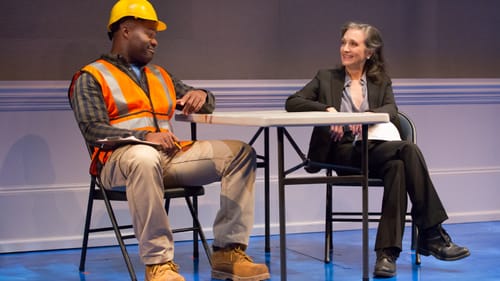Stay in the Loop
BSR publishes on a weekly schedule, with an email newsletter every Wednesday and Thursday morning. There’s no paywall, and subscribing is always free.
‘Fire’ burns bright
Philadelphia Theatre Company presents Adam Bock's ‘A Small Fire’

In Adam Bock’s A Small Fire, which opens the 45th anniversary season at Philadelphia Theatre Company (PTC), a woman gradually loses her senses to a mysterious illness. Confident and swaggering when we first meet her, Emily Bridges (Bebe Neuwirth) grows progressively timid and helpless.
Her long-suffering husband John (John Dossett) and adult daughter Jenny (Sarah Gliko)—previously targets of her contempt and ire—become her caregivers out of necessity. In the onstage span of an hour, Emily devolves from the no-nonsense boss of a construction business to a woman who can’t put her own socks on. The corporeal diminishment practically infantilizes her.
Human uncertainties
If this sounds like the makings of a three-hanky movie of the week, I won’t blame you. And if you read my description of Emily’s condition and feel a twinge of discomfort at the loss of vision or hearing being considered analogous to death, I understand. After all, millions of people live rich and full lives without the ability to see or hear.
But Bock—who is among the top tier of current American dramatists—is a keen observer of how people move through the world, and A Small Fire is, at its core, an exploration of the uncertainties embedded in life, love, and aging. It also considers how people move forward, or don’t, when their identities are irrevocably altered.
A new way of living
For Emily, control is everything. On the job site, she commands respect and gets what she wants, often through her tough but friendly relationship with her lieutenant, Billy Fontaine (Oge Agulué). The same is true of her home life, where John—a mild-mannered human resources professional—acquiesces to his wife’s whims and serves as their daughter’s primary sounding board.
Bock makes clear that Emily and Jenny share a contentious relationship, which he suggests through Jenny’s upcoming wedding to a man of whom Emily doesn’t approve. When Emily is forced to lean on the very same people she once dominated, she understandably chafes. The fact that Emily loses her previous abilities to sense the world is less debilitating, or disorienting, than having to learn that human connection and asking for assistance are a necessary part of being a person. At its core, the play—which packs an admirable amount of discovery and consideration into a tight 80 minutes—charts Emily’s awakening to a new way of living.
Quietly moving studies
Neuwirth gives a performance of astonishing physicality and emotional clarity. You can see the dancer she once was in how she uses body language to convey her character’s shifting inner life. Emily’s proud, erect bearing gives way to diminished, slouchy stances, as she feels her light growing dimmer and her independence deserting her. (Lighting designer Rachael Cady aids in realizing the gradual desertion of Emily’s vision through stunningly unsettling effects.)

Neuwirth doesn’t cheaply telegraph rage or spite, nor does Emily’s personality change too quickly to suggest cloying artifice. In a way, she allows the illness to remove Emily’s mask and show the woman who was there all along: complicated, caring, and staggeringly human.
Under Joanie Schultz’s fluid, detailed direction, the entire cast create a moving portrait of life in upheaval. Dossett shows the audience John’s steadiness, while also hinting at the cracks forming beneath his stolid veneer. He also realizes his character’s fidelity to his wife in a genuine way, even as she treats him with casual cruelty. A scene in which John narrates the events of Jenny’s wedding to Emily—who, at that point, can still hear but cannot see—is a quietly moving study of devotion.
Gliko proves once again that she is one of our great local resources, as Jenny vacillates between exasperation and self-doubt. And although his character is slightly underwritten, Agulué expertly reveals Billy’s reasons for loyalty to his employer.
Chelsea M. Warren’s airy, speculative set design reflects the realities of Emily’s changing situation, as walls and furniture disappear as she dips deeper into the void. Christopher Colucci’s mawkish sound design, which suggests the underlying emotional situation too forcefully, is the production’s one genuine misstep.
Still here
Near the end of the play, Emily reminds her husband that, even as she loses her faculties, her core remains unchanged. “I’m still in here,” she says to him. So too is PTC—a company that continues the work of rebuilding and rebranding itself after several tough years. The blazing ember of A Small Fire shows what this company still has to offer, and after a lackluster 2018-2019 season, I hope this is the first of many fruitful stagings in PTC's future.
What, When, Where
A Small Fire. By Adam Bock. Directed by Joanie Schultz. Philadelphia Theatre Company. Through November 10, 2019, at the Suzanne Roberts Theatre, 480 S. Broad Street, Philadelphia. (215) 985-0420 or philadelphiatheatrecompany.org.
The Suzanne Roberts Theatre is an ADA-compliant venue, with wheelchair seating available on the orchestra and mezzanine levels. There will be an audio-described performance of A Small Fire on Wednesday, November 6 at 1pm, and an open-captioned performance on Saturday, November 9 at 2pm.
Sign up for our newsletter
All of the week's new articles, all in one place. Sign up for the free weekly BSR newsletters, and don't miss a conversation.

 Cameron Kelsall
Cameron Kelsall